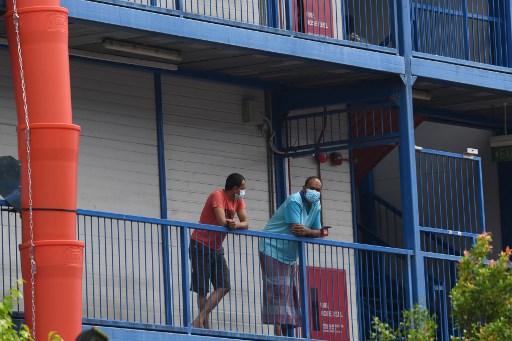Singapore—While the migrant worker dormitories, where 95 percent of Singapore’s Covid-19 infections occurred, have been cleared and many workers have returned to work, the possibility of future infection outbreaks still loom over them, highlighted Asia Times in a recent report.
But this is only one part of the burden they carry.
By and large, even with over 56,000 persons positive for Covid-19 and new daily infections down to double digits in the past few weeks, Singapore’s coronavirus response has been touted as a success, given that only 27 people have died and the country’s hospital systems have been able to operate smoothly without getting overtaxed.
At the same time, the pandemic has shone a light on the living conditions of Singapore’s large migrant worker population as well as the issue of income inequality. Alongside the possibility of infection outbreaks and a return to strict quarantine measures, workers rights activists have expressed concerns over the toll this has taken on their mental health, with recent reports of suicide attempts among migrant workers in the news.
To date, among the 323,000 foreign workers in dormitories, only 18,600 are still under quarantine, according to Asia Times, with 86 percent of workers in construction, marine shipyard and process industries back at their job sites.
And even with the dormitories declared cleared, strict safety protocols are still in place, including regular testing, and for most workers, restricted access to the outside world on their days off and after working hours.
But with other countries that successfully managed outbreaks seeing a resurgence of infections, it’s still a possibility that migrant workers may experience the same, which could mean strict quarantine rules again for entire dormitory blocs.
Minister Lawrence Wong, who co-chairs the ministerial task force assigned to tackle the issues stemming from the pandemic, warned that the dorms wouldn’t be “permanently Covid-safe.” He added that the workers would remain under restrictions “as long as residual cases from the dorm clusters remain a concern.”
Asia Times quotes infectious disease specialist Benjamin Rolfe as saying, “It is inevitable that new outbreaks will occur. The question is whether the nation can detect those cases and move rapidly to isolate them.”
This is apparently why the Ministry of Manpower (MOM) took action after one infection emerged in a cleared dormitory, putting 800 workers under quarantine once more.
“We have quarantined the whole block in the first instance while the assessment is being made as a precautionary measure. While this approach could affect up to a few hundred migrant workers for each case, it ensures that we contain the detected case and minimize spreading that could end up affecting thousands of others,” said the MOM.
But, out of a concern for the mental health of migrant workers, some are calling for the easing of restrictions and the provision of mental health services for the workers.
According to activist and rights worker Jolovan Wham, “What is reported in the media only scratches the surface of the huge mental health problems the workers are facing. The authorities need to allow workers who are not infected with the virus to leave the dormitories. It is highly discriminatory for the government to allow the rest of the community freedom of movement but not the migrant workers.”
The dean of National University of Singapore’s (NUS) Saw Swee Hock School of Public Health, Teo Yik Ying, said, “What is needed is a comprehensive approach towards allowing the migrant workers to return to the usual communal activities as before, but with the necessary safe management measures to minimize infection risks,” adding that this would be more effective in the long run in addressing the issue of mental health.
How the country handled the coronavirus among migrant workers has been criticized from the beginning, with critics saying the government ignored calls from rights activists who warned that the crowded, and sometimes unhygienic, conditions in the dormitories would become a hotspot for rampant spread.
This led to more criticism of prioritizing profit over public health and safety. According to Asia Times, “The city-state’s largest-ever humanitarian and public health crisis has also raised questions about Singapore’s culture of accountability relative to other developed Asian nations.” —/TISG
Read also: Migrant worker found with throat slit after alleged suicide attempt
Migrant worker found with throat slit after alleged suicide attempt

